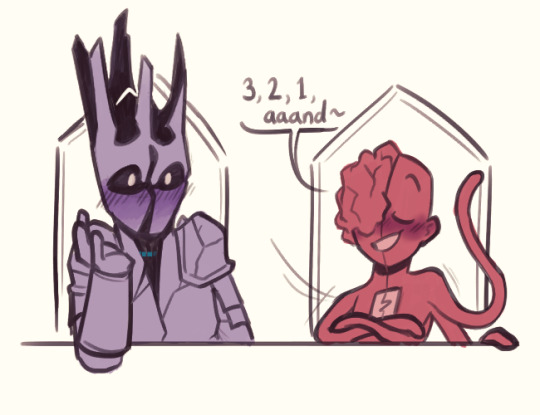#i love the morale counter telling on volition. i use this so fucking often in my fics hkgh volition voice ''Of course I'm not sad.''
Text





with kisses like these, who needs magnesium?
#disco elysium#disco elysium fanart#disco elysium skills#de skills#de volition#de electrochemistry#skillship#skillshipping#volition#electrochemistry#volistry#voliart#GET LOVED. IDIOT!! GET KISSED!! comic ive been procrastinating on the last panel on and got it all done tonight hkjg#i love the morale counter telling on volition. i use this so fucking often in my fics hkgh volition voice ''Of course I'm not sad.''#[DAMAGED MORALE -1] echem voice ''mmhm right. anyway do you want me to hug you and remind you of good things about the world?''#things i think about often. kisses for volition. and making him lose his cool. luckily! these things often go hand in hand!! :]#ough. my idiot knight guy who i cherish. and echem my lovely silly guy!! i love drawing him smug#i feel like i was supposed to say something in the tags but i!! forgot!! so oh well!! peace out gang
81 notes
·
View notes
Text
Groundwork of the Metaphysics of Morals

“Two things fill the mind with renewed and increasing awe and reverence the more often and the more steadily that they are meditated on: the starry skies above me and the moral law inside me. I have not to search for them and conjecture them as though they were veiled in darkness or were in the transcendent region beyond my horizon; I see them before me and connect them directly with the consciousness of my existence.”
-Immanuel Kant, Critique of Pure Reason-
No one has all the answers, not in terms of absolutes, not in the evolving cosmic mystery, not in the finite assertions of scripture or the many other counter-claims beloved of aspiring messiahs. Everyone has something to say; it doesn’t make it true, it doesn’t make it valid. The world’s awash with amateur “thought” and tides that rise by trends to express it.
And no, you don’t need to tell me that this was quite the opposite of what Kant meant when he urged his contemporaries to “have the courage to use your own reason” and to discard the primordial superstitions of the medieval past. “That is the motto of the enlightenment,” he wrote. As wise as it was, it is today – a locus of seeing, of balance, of truth.
I should probably pause here to explain that my point with this is not to deconstruct the enormity of civilised discourse that stems to and from the eighteenth century. Rather, I am taken with the notion of clarity; and whilst the sum is hardly exclusive to self, I do wish to catalogue the solidity within my fluid.
What does that mean? Simply that I need to take my mind for a walk. I have a degree in English Literature with a minor in Philosophy and a post-grad in teaching; I’ve spent almost my entire life in a classroom in some capacity – I know what I’m talking about. But that doesn’t mean I get to rest on my tenure.
It doesn’t mean that I get to bullshit around the question of why – or how, or fucking hell, or maybe.
I don’t, you don’t, no one really does. Then again, most people don’t hold themselves to account that way. Even the ones who can loosely throw a sentence together are rarely articulate in a cohesive sense. Self-taught is all well and good, but it only gets you so far. At some point, expertise is required as are accommodations more expansive than an echo chamber. Because a prevailing culture of anti-intellectualism? A dearth in the Humanities? Think about it...
When was the last time it led to anything other than bigotry?
But I have good intentions, you might be crying. And fair enough, you might. Still, intentions alone are like any other ill-informed design. As for compassion? Love? Without logic, they too are blind – and we have a few checkered centuries to prove it.
So if not that, then what?
Two hundred years after Kant mused that, “Innocence is a splendid thing, only it has the misfortune not to keep very well and to be easily misled,” Isaac Asimov conveys his own sense of moral skill as defined by character and courage:
“It’s insulting to imply that only a system of rewards and punishments can keep you a decent human being. Isn’t it conceivable a person wants to be a decent human being because that way he feels better?
I don’t believe that I’m ever going to heaven or hell. I think that when I die, there will be nothingness. That’s what I firmly believe. That’s not to mean that I have the impulse to go out and rob and steal and rape and everything else because I don’t fear punishment. For one thing, I fear worldly punishment. And for a second thing, I fear the punishment of my own conscience. I have a conscience. It doesn’t depend on religion. And I think that’s so with other people, too.”
Conviction, then. Conscience. The foundation of what we have come to recognise as the secular ideal: commitment to truth based on evidence rather than faith alone; separation from assigning sanctity to any one person, group or text as the sole custodian of that truth; adherence to compassion as a means to reduce suffering in ways that cause as little harm as possible. Responsibility, you might say, is the central tenet; and the thirst to question as necessary as any instinct for water.
As Yuval Noah Harari writes in 21 Lessons for the 21st Century:
“...secular education teaches children to distinguish truth from belief; to develop their compassion for all suffering beings; to appreciate the wisdom and experiences of all the earth’s denizens; to think freely without fearing the unknown; and to take responsibility for their actions and for the world as a whole.”
Fear is a natural consequence of placing all one’s faith in prescribed “facts”, but modern history shows that societies of individuals willing to admit ignorance and ask questions are far more prosperous and peaceful than those subject to rigid dogma. Fear, it goes, is the embodiment of fear itself – and we must remember that it is precisely those who believe they have a righteous mandate who are truly capable of any atrocity.
Aristotle wrote of the importance of cultivating wisdom, not only for the good of society but as the substance of a happy life. To translate this into pedagogy, we must encourage the evaluation of choices, explore storytelling – first as a means to exercise empathy and then to undertake that passionate dig through interpretation, critique and the analysis of figurative semantics. As for rules, they fulfil an array of practical functions. But the wise will always understand when the context demands we bend them.
“A good will is good not because of what it performs or effects,” Kant writes, “...not by its aptness for the attainment of some proposed end, but simply by virtue of the volition – that is, it is good in itself, and considered by itself to be esteemed much higher than all that can be brought about by it in favour of any inclination, nay, even of the sum-total of all inclinations... like a jewel, it would still shine by its own light, as a thing which has its whole value in itself.”
Loyal to the last is how I view my secular ethics. Just as to give is to receive and to serve is to be revered, it’s a matter of proportion. As I’ve mentioned before, the lessons flow both ways; past and future, myriad gone and myriad yet to come, of age regardless. And the truth remains, we all need good teachers – fallible in the human sense and secure enough to admit it; beholden to no travesty of myth but always open-voiced and honest.
“Educating the mind without educating the heart is no education at all,” Aristotle purports. It’s a process of trust. As for us, we are only what we are, day by day, repeated.
#writing#quote#love#life#purpose#meaning#existential musings#all eternal things#love in a time of...#intelligence quotients#depth perception#understanding beyond thought#truth be told#more than words#intertextuality of sorts#this is who i am#elisa english#elisaenglish
1 note
·
View note